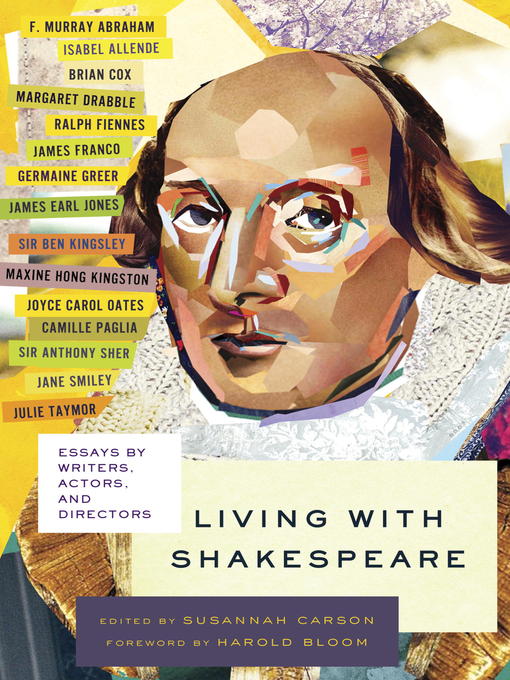
Living with Shakespeare
Essays by Writers, Actors, and Directors
فرمت کتاب
ebook
تاریخ انتشار
2013
Lexile Score
1230
Reading Level
9-12
نویسنده
Harold Bloomشابک
9780307743404
کتاب های مرتبط
- اطلاعات
- نقد و بررسی
- دیدگاه کاربران
نقد و بررسی

Starred review from February 25, 2013
In this lively volume, an esteemed (and in many instances, famous) group of actors, directors, authors, academics, and others share insights and experiences about their relationship to Shakespeare’s literary and dramatic inheritance. Editor Carson’s eclecticism aims to break down the usual disciplinary borders and reduce the intimidating distance that often yawns between Shakespeare experts and general readers. The volume succeeds at this admirably across a compelling range of biographical accounts, actor’s insights, and production notes. Minor and major contradictions across essays, rather than dismaying, tend to be thought-provoking. The essays include much justified reverence, but also some healthy questioning, as well as limited forays into cross-cultural dialogues. Contributors overwhelmingly skew to American and British practitioners, with the odd Canadian, Australian, and South African. As the editor’s stated goal includes bringing together as many perspectives as possible, the nearly complete lack of non-native English speakers (Isabelle Allende proves the sole exception) is all the more disappointing. It would have been nice, for example, to hear from famed German director Tomas Ostermeier, whose extraordinary 2008 Schaubühne production of Hamlet receives passing mention. That said, the collection is a consistently stimulating read, which goes a great way toward illuminating the degree to which we all live already—and can live even further—with Shakespeare.

February 15, 2013
An eclectic collection of pieces from an eclectic collection of writers about reading, directing, performing and adoring the Bard of Avon. The included writers agree on a few things, including the dreadful experiences they had with Shakespeare in secondary school--although Margaret Drabble felt quite the opposite; an amusing alliterative example from comic-book artist Conor McCreery: "I was taught that Shakespeare should scare the shit out of me." Another bright thread in the weave of all the essays: an enduring affection for Shakespeare. Poet J.D. McClatchy calls him "the language's premier poet." Some contributors focus on individual plays. James Earl Jones has a long piece about his journeys with Othello; F. Murray Abraham writes about the complexities of Shylock; Eve Best compares Beatrice and Benedick with tennis legends Borg and McEnroe; Jane Smiley remembers how King Lear inspired A Thousand Acres; Joyce Carol Oates waxes academic about Antony and Cleopatra; Julie Taymor explains why she decided to cast Helen Mirren as "Prospera" in her film of The Tempest. Virtually all of the writers are generous to others in the Shakespeare world, although Jess Winfield has some unhappy words for Kenneth Branagh's film of Hamlet. A couple of writers talk about the wonders of producing and performing Shakespeare at the reconstructed Globe in London, while others defend the late "problem" play Cymbeline. Maxine Hong Kingston recalls teaching Romeo and Juliet to adolescents. The least engaging essays tend to be those written by academics; the most, by those who have a passion for performance and a love of the language. Other contributors include Camille Paglia, Isabelle Allende and James Franco. Bardolaters, thespians, logophiles and followers of the muses Thalia and Melpomene--all will find light and warmth, comfort and companionship in these glowing pages.
COPYRIGHT(2013) Kirkus Reviews, ALL RIGHTS RESERVED.

Starred review from March 1, 2013
Carson (editor, A Truth Universally Acknowledged: 33 Great Authors on Why We Read Jane Austen) has recruited pieces from prominent individuals on their personal and/or professional engagement with Shakespeare. It's an appealing collection, with a dozen essays by actors, eight by directors, ten by writers (e.g., Margaret Drabble and Joyce Carol Oates), and seven by academics, including physicist Brian Cox. They cover a range of topics but principally two: why Shakespeare still appeals and how one goes about "doing" him--acting, directing, adapting, even simply reading his work. The quality of the essays ranges from above average to excellent. The best include Germaine Greer writing about floral imagery in Shakespeare and Royal Shakespeare Company voice director Cicely Berry on presenting Lear. There are lively and informative essays by actors Anthony Sher, Rory Kinnear, Eamonn Walker, Jess Winfield, Ralph Fiennes, and James Earl Jones, and a fascinating essay by the codirectors of New York's Fiasco Theater Company on staging the virtually undoable Cymbeline. VERDICT This collection is a must for anyone interested in reading, acting, or directing Shakespeare. A good selection for most libraries. Enthusiastically recommended.--David Keymer, Modesto, CA
Copyright 2013 Library Journal, LLC Used with permission.

April 15, 2013
Novelist Isabel Allende keeps a volume of Shakespeare on her nightstand, where other people would keep a Bible. Literary critic Harold Bloom regards Shakespeare's poetry as the holy text for a secular religion, with Shakespeare himself as God. If Shakespeare has indeed become a deity, the exalted figure in a literary-cultural faith, then Carson has done readers a great service by collecting these 38 essays, revealing in their astonishing diversity how capacious, how protean, that faith has become. It is, as readers learn by listening to actor James Earl Jones, a faith that inspires us with the celestial force of Othello, whom Jones has nicknamed the Sun God. But is also a faith filled with frightening devils, as actor-director Ralph Fiennes reminds us, when he discusses the boundless wrath and withering misanthropy of Coriolanus. It is a faith compelling actor Brian Cox to wrestle with existential questions, yet one that allows author Jess Winfield to indulge in facetious wordplay. A cornucopia of delights for lovers of the Bard.(Reprinted with permission of Booklist, copyright 2013, American Library Association.)

























دیدگاه کاربران